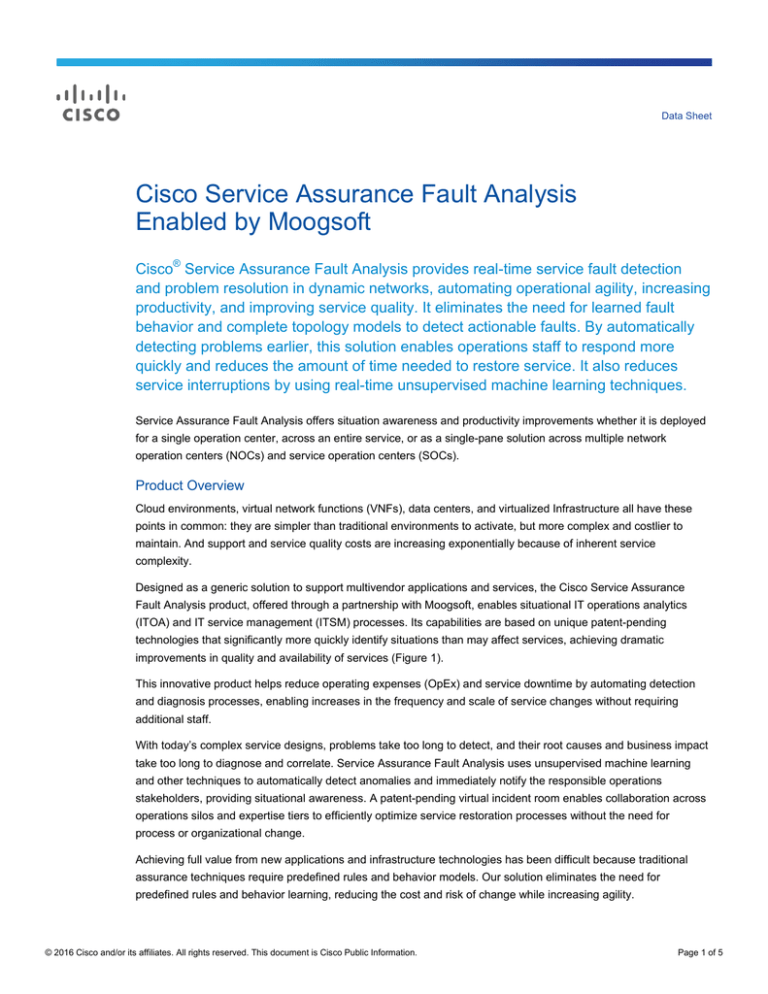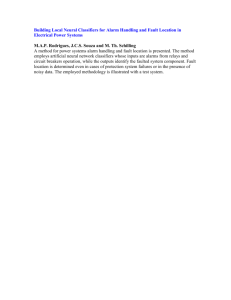
Data Sheet
Cisco Service Assurance Fault Analysis
Enabled by Moogsoft
Cisco® Service Assurance Fault Analysis provides real-time service fault detection
and problem resolution in dynamic networks, automating operational agility, increasing
productivity, and improving service quality. It eliminates the need for learned fault
behavior and complete topology models to detect actionable faults. By automatically
detecting problems earlier, this solution enables operations staff to respond more
quickly and reduces the amount of time needed to restore service. It also reduces
service interruptions by using real-time unsupervised machine learning techniques.
Service Assurance Fault Analysis offers situation awareness and productivity improvements whether it is deployed
for a single operation center, across an entire service, or as a single-pane solution across multiple network
operation centers (NOCs) and service operation centers (SOCs).
Product Overview
Cloud environments, virtual network functions (VNFs), data centers, and virtualized Infrastructure all have these
points in common: they are simpler than traditional environments to activate, but more complex and costlier to
maintain. And support and service quality costs are increasing exponentially because of inherent service
complexity.
Designed as a generic solution to support multivendor applications and services, the Cisco Service Assurance
Fault Analysis product, offered through a partnership with Moogsoft, enables situational IT operations analytics
(ITOA) and IT service management (ITSM) processes. Its capabilities are based on unique patent-pending
technologies that significantly more quickly identify situations than may affect services, achieving dramatic
improvements in quality and availability of services (Figure 1).
This innovative product helps reduce operating expenses (OpEx) and service downtime by automating detection
and diagnosis processes, enabling increases in the frequency and scale of service changes without requiring
additional staff.
With today’s complex service designs, problems take too long to detect, and their root causes and business impact
take too long to diagnose and correlate. Service Assurance Fault Analysis uses unsupervised machine learning
and other techniques to automatically detect anomalies and immediately notify the responsible operations
stakeholders, providing situational awareness. A patent-pending virtual incident room enables collaboration across
operations silos and expertise tiers to efficiently optimize service restoration processes without the need for
process or organizational change.
Achieving full value from new applications and infrastructure technologies has been difficult because traditional
assurance techniques require predefined rules and behavior models. Our solution eliminates the need for
predefined rules and behavior learning, reducing the cost and risk of change while increasing agility.
© 2016 Cisco and/or its affiliates. All rights reserved. This document is Cisco Public Information.
Page 1 of 5
By using machine learning, Service Assurance Fault Analysis can detect faults from 15 minutes to 24 hours earlier
than traditional approaches. The product also can automatically capture knowledge and apply it to future situations,
reducing the diagnosis time for recurring problems to zero. This early detection and diagnosis enables a more
proactive approach to support and reduces the likelihood of major incidents.
Figure 1.
Cisco Service Assurance Fault Analysis Logical Architecture
Service Assurance Fault Analysis provides:
●
Reduced mean time to detect actionable incidents: The solution uses patent-pending real-time
unsupervised and supervised machine learning algorithms to infer anomalies without the need for
previously modeled behavior.
●
Reduced time to act with a reduction in actionable work items: The solution pushes notifications to
stakeholders, making them situationally aware of their contextual relationship with the problem and the
cause or collateral impact.
●
Reduced mean time to diagnose causes: The solution clusters events related to cause and impact,
offering previously learned resolution knowledge, a 360o diagnostics workbench, and situation-enabled
collaboration.
●
Reduced time to restore service: Through earlier detection, earlier action, easier diagnosis, use of
previous knowledge, and the capability to automate remediation actions, you can restore service more
quickly.
●
Reduced service interruptions: Through the use of early warnings and previous knowledge, the solution
helps identify situations than may affect service ahead of time and reduces the likelihood of service
interruption. This capability helps service providers move from continual crisis mode to proactive
management of problems.
© 2016 Cisco and/or its affiliates. All rights reserved. This document is Cisco Public Information.
Page 2 of 5
Features and Benefits
Table 1 lists the main features of Service Assurance Fault Analysis.
Table 1.
Main Features
Main Features and Capabilities
Benefit
Fault and impact detection across network, service, and
application layers through the use of supervised and
unsupervised machine-learning algorithms to filter, analyze, and
contextualize events from all layers
Provides real-time fault-impact detection
Automapping of organizational structure and customized
notifications and user experience
Saves time and reduces operational overhead
Virtual fault management center, or “war room”
Provides capability to effectively collaborate on specific faults or
incidents
Autocapture of knowledge from all chat and discussion threads,
and autotriggering of runbooks and scripts based on fault
detection
Saves time by identifying the right remediation for the particular fault or
incident
More than 98% reduction in the number of raw events that become
actionable situations
Reduced actionable work
Push-notification anomaly detection
Reduced time needed to detect and act on problems
Distributed bus architecture
Effective, carrier-class scalability (Today, customers are using the
product to administer more than 450,000 managed devices: both
physical and virtual networked devices, including routers and switches
and virtual machines.)
Scalability to more than 5000 event messages per second
(demonstrated at up to about 8000 events per second in
production deployments)
High load scalability
Support for more than 200 concurrent users across multiple
departments and businesses without the need to make process or
organizational changes
Enterprise- and carrier-class support
Configuration and extensibility using JavaScript
Low-cost support
Ingress integrations with up to 40 standard management tools
Rapid deployment
Single pane for diagnosis tools
Reduced mean-time to diagnose
Collaboration- and situation-enabled workflows
Multidomain and multivendor operations
Synchronized integration with ticketing systems out of the box
Use of existing workflow
Multitenant architecture (in production environments with largescale managed service providers [MSPs])
MSP ready
High-availability architecture
Cloud and enterprise ready
Software-as-a-service (SaaS), on-premises, and hybrid
implementations
Deployment flexibility
Industrialized patent-pending algorithmic machine-learning
approach
Reduced cost of maintenance and ownership
Scores faults for similarity to previous faults; if a match is found, the
previous remediation is triggered
System Requirements
Table 3 presents the system requirements for Service Assurance Fault Analysis.
Table 2.
System Requirements
Deployment Size
Small
Scale
Computing
● Up to 10,000 managed devices
● Up to 100 events per second
● Single Intel or AMD 4- or 6-core processor
● 16 GB of RAM minimum (32 GB recommended)
● Up to 5 enrichment sources
● 1 Gigabit Ethernet
● 2 x 500-GB disks with RAID 1 and 0
© 2016 Cisco and/or its affiliates. All rights reserved. This document is Cisco Public Information.
Page 3 of 5
Deployment Size
Medium
Large
Scale
Computing
● 10,000 to 100,000 managed devices
● Up to 1000 events per second
● Single Intel or AMD 4- or 6-core processor
● 32 GB of RAM minimum (64 GB recommended)
● Up to 10 enrichment sources
● 1 Gigabit Ethernet
● 2 x 1 terabyte (Tb) disks with RAID 1 and 0, and 5 x 2-Tb
disks with RAID 5
● More than 100,000 managed devices
● 1000 to 10,000 events per second*
● Dual Intel or AMD 4- or 6-core processors
● 64 GB of RAM minimum (128 GB recommended)
● More than 10 enrichment sources
● 2 x 1 Gigabit Ethernet connections
● 2 x 1-Tb disks with RAID 1 and 0, and 5 x 2-Tb disks with
RAID 5
Ordering Information
The real-time Service Assurance Fault Analysis Software requires a right-to-use (RTU) subscription license for
each device or function monitored by the software (a managed device). Managed devices include both physical
network functions (physical devices) and VNFs.
One-year or three-year subscription RTU licenses must be purchased separately for each managed device.
Table 4 provides ordering information.
Table 3.
Ordering Information
Part Number
Description
R-CISCO-MOOG-K9
Cisco - Service Assurance Fault Analysis ATO
MOOG-INC-K9
Service Assurance Fault Analysis Platform SW, License
MOOG-INC-LAB-K9
Service Assurance Fault Analysis Platform SW Lab, License
MOOG-CAR-MD-1Y
Ser. Assur. Fault Analysis- Carrier MD Subscr Lic,1 Yr
MOOG-CAR-MD-3Y
Ser. Assur. Fault Analysis - Carrier MD Subscr Lic, 3 Yrs
MOOG-ENT-MD-1Y
Ser. Assur. Fault Analysis - Enterprise MD Subscr Lic,1 Yr
MOOG-ENT-MD-3Y
Ser. Assur. Fault Analysis - Enterprise MD Subscr Lic, 3 Yrs
MOOG-VNFI-MD-1Y
Ser. Assur. Fault Analysis - VNFI MD Subscr Lic, 1 Yr
MOOG-VNFI-MD-3Y
Ser. Assur. Fault Analysis - VNFI MD Subscr Lic, 3 Yrs
Cisco Capital Financing to Help You Achieve Your Objectives
Cisco Capital® financing can help you acquire the technology you need to achieve your objectives and stay
competitive. We can help you reduce capital expenditures (CapEx), accelerate your growth, and optimize your
investment dollars and ROI. Cisco Capital financing gives you flexibility in acquiring hardware, software, services,
and complementary third-party equipment. And there’s just one predictable payment. Cisco Capital financing is
available in more than 100 countries. Learn more.
For More Information
For more information, please contact your local Cisco sales representative.
© 2016 Cisco and/or its affiliates. All rights reserved. This document is Cisco Public Information.
Page 4 of 5
Printed in USA
© 2016 Cisco and/or its affiliates. All rights reserved. This document is Cisco Public Information.
C78-736603-00
02/16
Page 5 of 5


